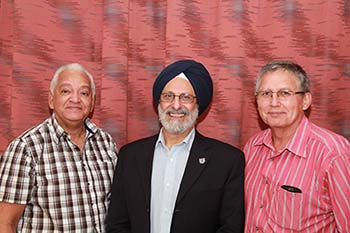
From the left are: Prof Neil Heideman, Dean of the Faculty of Natural and Agricultural Sciences, Mr Shammy Puri, secretary-general of the International Association of Hydrogeologists, and Prof Danie Vermeulen, Director of the Institute for Groundwater Studies.
Photo: Supplied |
The Institute for Groundwater Studies (IGS) is in the process of establishing a SADC Groundwater Management Institute, sponsored by the World Bank. To coincide with this process, the IGS received a visit from Mr Shammy Puri, the secretary-general of the International Association of Hydrogeologists (IAH).
“The aim of the visit was to further cooperation between the IAH and IGS regarding transboundary aquifers in the SADC region,” said Prof Danie Vermeulen, Director at the IGS.
The International Association of Hydrogeologists (IAH/AIH) is a scientific and educational charitable organisation for scientists, engineers, water managers, and other professionals working in the fields of groundwater resource planning, management, and protection. The IAH is the leading international society for the science and practice of hydrogeology, and is a globally recognised information source and facilitator for the transfer of groundwater knowledge.
Mr Shammy Puri was elected Secretary-General of IAH in 2008, and chaired the Commission on Transboundary Aquifer Resources Management (TARM) from 1998 to 2011.
During his visit, Mr Puri also presented lectures to the postgraduate students at the Institute on Transboundary Aquifers. He was also invited by the Dean of the Faculty of Natural and Agricultural Sciences, Prof Neil Heideman, to present the faculty prestige lecture later this year.